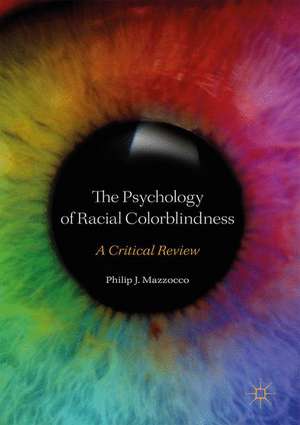The Psychology of Racial Colorblindness: A Critical Review
Autor Philip J. Mazzoccoen Limba Engleză Hardback – 8 iun 2017
| Toate formatele și edițiile | Preț | Express |
|---|---|---|
| Paperback (1) | 578.70 lei 6-8 săpt. | |
| Palgrave Macmillan US – 12 mai 2018 | 578.70 lei 6-8 săpt. | |
| Hardback (1) | 726.69 lei 6-8 săpt. | |
| Palgrave Macmillan US – 8 iun 2017 | 726.69 lei 6-8 săpt. |
Preț: 726.69 lei
Preț vechi: 886.21 lei
-18% Nou
Puncte Express: 1090
Preț estimativ în valută:
139.05€ • 145.55$ • 115.74£
139.05€ • 145.55$ • 115.74£
Carte tipărită la comandă
Livrare economică 31 martie-14 aprilie
Preluare comenzi: 021 569.72.76
Specificații
ISBN-13: 9781137599674
ISBN-10: 1137599677
Pagini: 224
Ilustrații: XVII, 205 p. 3 illus.
Dimensiuni: 148 x 210 x 14 mm
Greutate: 0.42 kg
Ediția:1st ed. 2017
Editura: Palgrave Macmillan US
Colecția Palgrave Macmillan
Locul publicării:New York, United States
ISBN-10: 1137599677
Pagini: 224
Ilustrații: XVII, 205 p. 3 illus.
Dimensiuni: 148 x 210 x 14 mm
Greutate: 0.42 kg
Ediția:1st ed. 2017
Editura: Palgrave Macmillan US
Colecția Palgrave Macmillan
Locul publicării:New York, United States
Cuprins
1. Introduction.- 2. Race and Colorblindness: A Historical Overview.- 3. Existing Theories of Colorblindness and a New Framework.- 4. Colorblind Measures and Inductions.- 5. The Reality of Racial Inequality in America.- 6. Perceptions of Racial Inequality in America.- 7. Colorblind Impacts: Individual, Interactional, and Societal.- 8. Institutional Colorblindness: Education, Law, and Organizations.- 9. Building a Conceptual Network around Colorblindness.- 10. Challenging Colorblindness and Future Directions.
Recenzii
Selected by Choice magazine as an Outstanding Academic Title for 2018
“Based on a review of how colorblindness has been conceptualized and measured in the psychological literature, Mazzocco presents a ‘four-variety model’ that integrates existing findings on the topic. … Written in a clear and well-defined manner, the book is an essential resource for academic readers interested in racial colorblindness. Summing Up: Essential. Upper-division undergraduates and above; researchers and faculty.” (I. I. Katzarska-Miller, Choice, Vol. 55 (6), February, 2018)“The Psychology of Racial Colorblindness would be a welcome addition to the library of anyone who researches the topic of race, not just from the psychological perspective, but also from the point of view of other social sciences. The book could also easily serve as a textbook for graduate and advanced undergraduate courses in race or prejudice studies in psychology. Finally, the chapters delineating racial history and harms could usefully be shared with broad audiences.” (C. Albert Bardi and Kasey Marshall, PsycCRITIQUES, Vol. 62 (46), November, 2017)
Notă biografică
Philip J. Mazzocco is Associate Professor of Psychology at The Ohio State University at Mansfield, USA. His research focuses on race-related perceptions and attitudes.
Textul de pe ultima copertă
This book summarizes and integrates the social scientific research on racial colorblindness, focusing primarily on work within the field of psychology. A new multi-variety colorblind framework is presented, which provides theoretical coherence to the present literature as well as a guide for future research. After considering the historical context in which colorblind ideologies have manifested and operated, research is presented that establishes how the colorblind mentality ignores important racial realities and tends to harm racial minorities across a wide variety of domains. Beneficial alternative ideologies are discussed, as are strategies that may be useful in challenging the colorblind ideology. This book will be of interest to both researchers and theorists who study racial ideology, as well as social justice advocates and practitioners who contend with racial colorblindness in real-world contexts.
Caracteristici
Contains a new framework suggesting that there are four separate varieties of racial colorblindness Provides a compelling argument against the ideal of racial colorblindness Discusses the ramifications of racial colorblindness within the context of current events and movements
